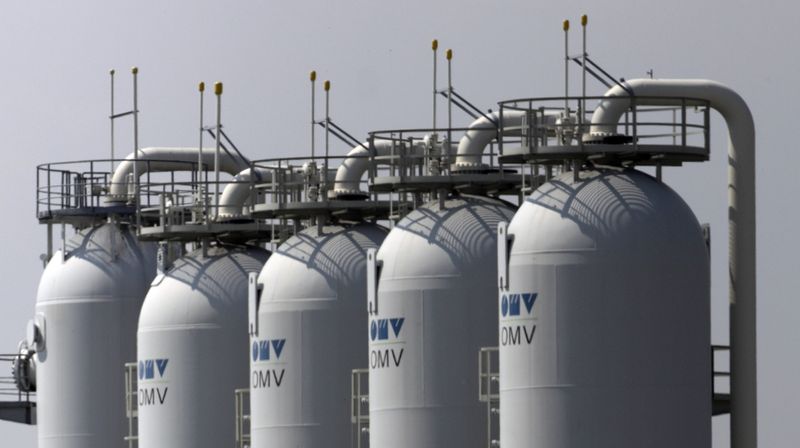By Alexandra Schwarz-Goerlich and Dmitry Zhdannikov
VIENNA/LONDON (Reuters) – The trigger that ended more than 50 years of gas flows from Russian state energy giant Gazprom (MCX:) to OMV earlier this month was the Austrian group’s seizure of Russian gas as payment to cover the value of an arbitration award, five sources told Reuters.
OMV was among the few remaining buyers of Russian gas in Europe after Gazprom lost almost all its customers there in the wake of Russia’s invasion of Ukraine in 2022. Before the war began, Russia was Europe’s single biggest supplier of .
On Nov. 13 OMV said it had won an arbitration case in Germany against Gazprom for 230 million euros ($239 million) in connection with irregular supplies to its German unit, and would take steps to immediately enforce it against Gazprom’s invoices.
Three days later, Gazprom suspended gas supplies to the Austrian company.
According to three sources close to Gazprom and OMV, the Austrian firm had impounded 230 million euros worth of gas deliveries for October. It was the first time a European Union customer had failed to pay for Gazprom’s gas, one of the sources close to Gazprom said.
A source close to OMV said it saw taking Gazprom’s gas supplies for October in lieu of the arbitration award as the last chance to do so if Ukraine, which plans to end a deal allowing Russian gas to transit its territory next year, stops Russian gas flows in January.
Gazprom considers the gas seizure as non-payment and hence stopped supplies, the source close to Gazprom said.
OMV had been buying Soviet and Russian gas since 1968, and the events signalled the Austrian firm is seeking ways to completely exit Russian gas purchases despite its contracts with Gazprom running until 2040, four of the five sources familiar with Gazprom and OMV operations said.
The stoppage of supplies last week gives OMV an opportunity to argue Gazprom has breached the contracts, one of the five sources said.
Gazprom declined to comment on future relations with OMV. An OMV spokeswoman said Gazprom’s deliveries had stopped, and that it did not expect the situation to change.
OMV’s seizure of the gas and resulting non-payment for Russia’s October gas supplies have not previously been reported.
LONGSTANDING INFLUENCE
The abrupt end to Gazprom and OMV’s relationship surprised many gas market insiders, and is a blow to Gazprom’s longstanding economic and political influence in central Europe.
Austria had been one of Gazprom’s most loyal customers, remaining almost fully reliant on Russian gas even as other EU members switched to imports from Norway, the U.S. and Qatar in 2022.
OMV’s contracts with Gazprom include a take-or-pay clause, which states that it must pay for gas supplied even if it does not take it.
According to a second source close to Gazprom, Austria’s big gas storage facilities have made it a stronghold for Gazprom in central Europe over the last two decades. The source added that Austria had saved billions on cheap Russian gas after the war in Ukraine began.
Austria had been receiving Russian gas at $300-$400 per 1,000 cubic metres when spot prices traded above $1,000 per 1,000 cubic metres at the peak of Russian supply cuts to Europe in 2022, the two sources close to Gazprom said.
OMV declined to comment on prices. OMV CEO Alfred Stern (AS:) has said Gazprom’s prices were aligned with market prices.
Despite Gazprom cutting off OMV from supplies, Austria has continued to receive Russian gas via Slovakia, a Reuters review of regional gas flows has shown.
Gazprom has sold more gas to Slovakia’s SPP since it stopped sales to OMV. SPP then resold gas to Austrian buyers, three of the five sources said.
The resales have not previously been reported. Gazprom and SPP declined to comment. OMV declined to say if it was buying gas from Gazprom indirectly through this arrangement.
CUTTING RELIANCE
OMV’s Stern had been planning to cut reliance on Russian gas after taking the role in 2021, said one of the five sources.
In addition to the action over irregular supplies in Germany, OMV has launched several other arbitration cases against Gazprom, having written down 2.46 billion euros worth of Russian investments after Moscow seized stakes it held in a Siberian gas field Yuzhno Russkoye.
Austria, whose government owns 31.5% of OMV, is politically neutral but supports sanctions against Russia.
Its chancellor Karl Nehammer was the first Western leader to visit Russian President Vladimir Putin after the invasion. Last year, its foreign minister Alexander Schallenberg said a complete decoupling from Russia was illusory.
Relations have become strained recently, however. Austria’s Raiffeisen Bank, the biggest Western bank in Russia, had its local Russian unit frozen by a Russian court in a separate row with magnate Oleg Deripaska. Raiffeisen has about 5 billion euros stranded in Russia.
On the day Gazprom cut gas supplies to OMV, Nehammer accused Moscow of using energy as a weapon.
Nehammer has remained in charge of a caretaker government since a September general election won by the Russia-friendly Freedom Party (FPO). But with around 29% of the vote, the FPO would have needed a coalition partner to command a majority in parliament and form a government.
Since no potential coalition partner was forthcoming, Nehammer has been tasked with forming a government instead and is negotiating with other parties to form a new coalition that would exclude the FPO.
Austria’s energy minister Leonore Gewessler said it was up to OMV to decide whether to exit from contracts with Gazprom.

“My task, and that of the federal government, is to create the framework conditions to make this exit possible,” she said.
($1 = 0.9608 euros)


